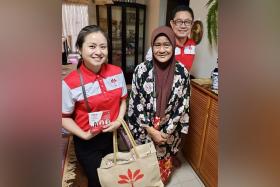Time for review of progress made towards multiracialism: Sylvia Lim
The time is right for Singapore to conduct a national review of the progress made towards multiracialism, Workers' Party (WP) chairman Sylvia Lim said yesterday as she kicked off the second day of debate on the President's Address.
While the hot-button topics of jobs and immigration continued to dominate, several MPs, including Ms Lim (Aljunied GRC), Ms Rahayu Mahzam (Jurong GRC) and newly-elected WP MP Raeesah Khan (Sengkang GRC), touched on the desire of young people to be part of the national conversation, especially on sensitive topics such as race.
Ms Lim said it was only logical that Singapore take concrete steps towards becoming a race-blind society and called for an open review of several issues.
"When will Singaporeans be ready for a non-Chinese Prime Minister? Many would argue that we already are," she said.
"Singaporeans have already risen above tribal instincts on many occasions. We can go further with the right policies and signalling at the official level."
Ms Lim suggested relooking the Chinese, Malay, Indian or Others model of ethnic classification, and questioned if ethnic self-help groups such as the Chinese Development Assistance Council (CDAC) reinforced racial consciousness and had unequal resources due to the different sizes of their ethnic pools.
"There is an opportunity here to come together as Singaporeans and contribute to a national pool, helping the less privileged on a race-blind basis," she said.
However, more race-based data is also needed to better understand issues that may affect particular communities and close the gap, she said.
She felt that the Housing Board's ethnic integration policy, and laws on minority candidates during elections, should also be reviewed.
She added: "We have had painful experiences of racial strife in the past. But as the President acknowledges, society's experiences and aspirations are not static. Each successive generation may yearn for and even demand a different approach."
In her maiden speech, WP's Ms Khan said young Singaporeans have been more than willing to start conversations about issues from climate change to sexual harassment.
Lowering the voting age from 21 to 18 would give young people more say and compel them to follow politics more closely.
She said: "If we want young Singaporeans to thrive in our next phase of development, we need to enable them to have a seat at the table."
Cautioning against polarisation, however, Ms Rahayu said Singapore has to find a better way to have discourse.
She warned that "cancel culture" often distracts from the substance of the matter and silences those with genuine views as they fear being judged or lynched by the angry mob.
The controversy over misogynistic comments made by hosts of popular podcast Okletsgo, for instance, turned out to be a highly polarising exercise instead of an opportunity to address an important issue.
Citing the Me Too and Black Lives Matter movements, Ms Rahayu said there is value in rallying people to call out injustices and shift norms, but Singaporeans should not follow such developments abroad blindly without adjusting for Singapore's needs.
"Multiracialism is a value we hold dear. We must therefore ensure that in our debates and discussions, we are mindful of the impact of our comments and the danger of fraying our social fabric if we pit one group against the other."
Get The New Paper on your phone with the free TNP app. Download from the Apple App Store or Google Play Store now




